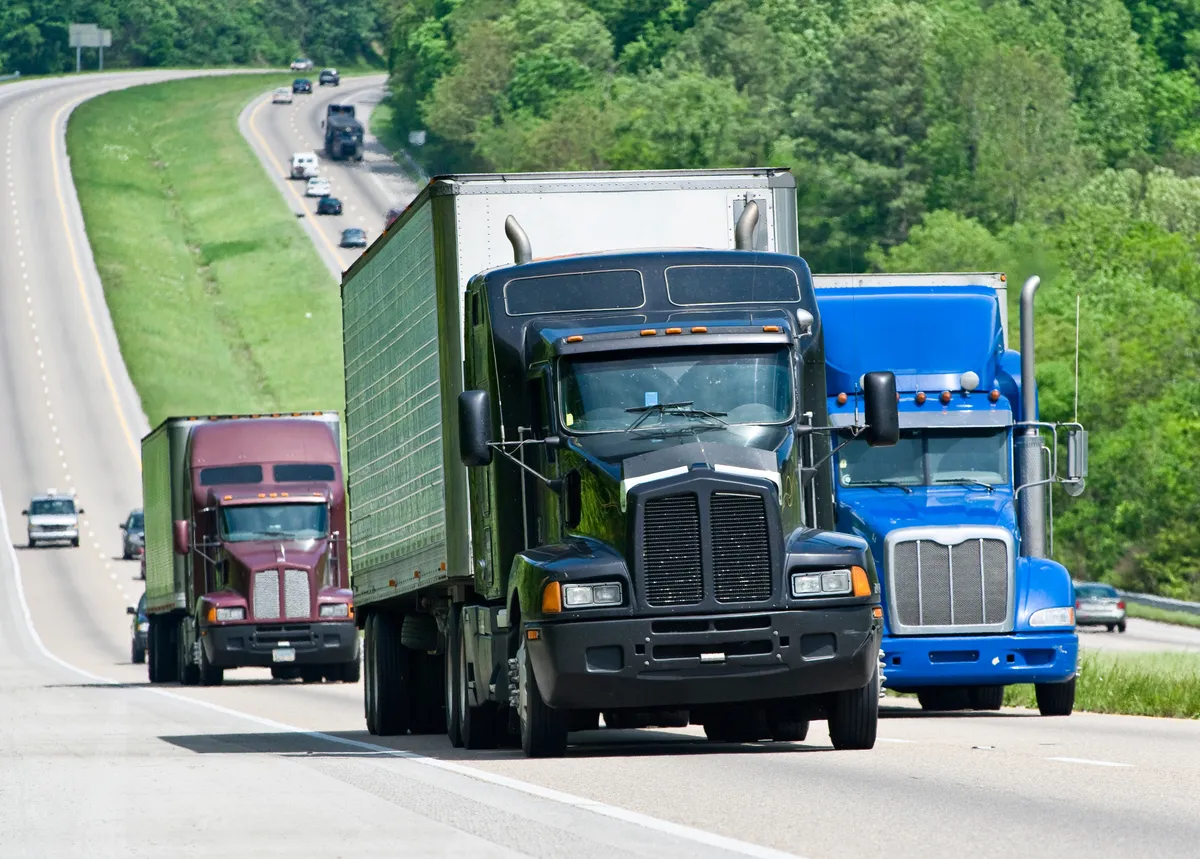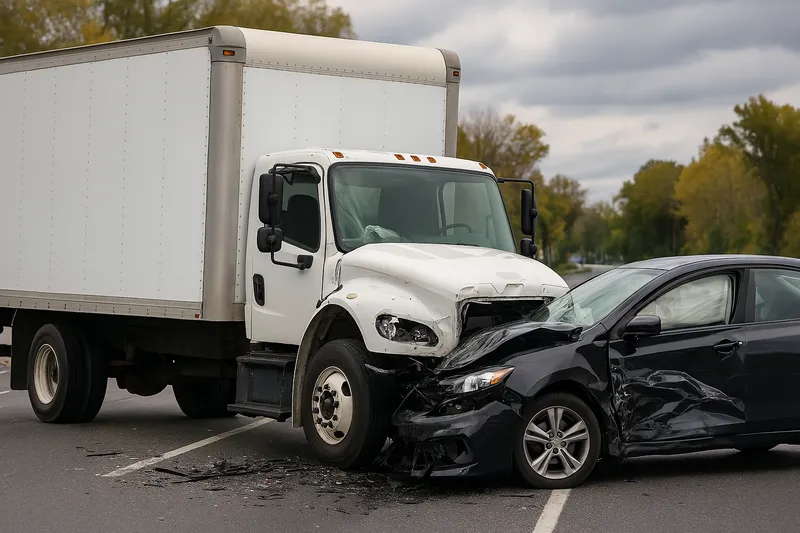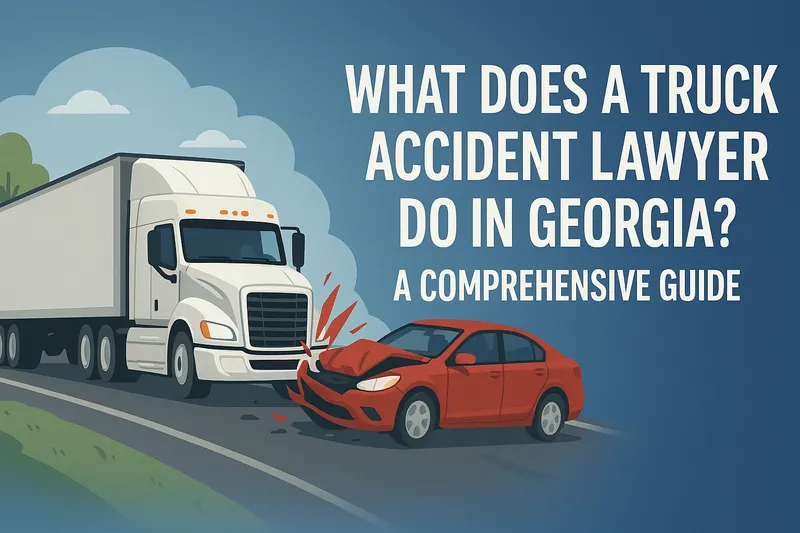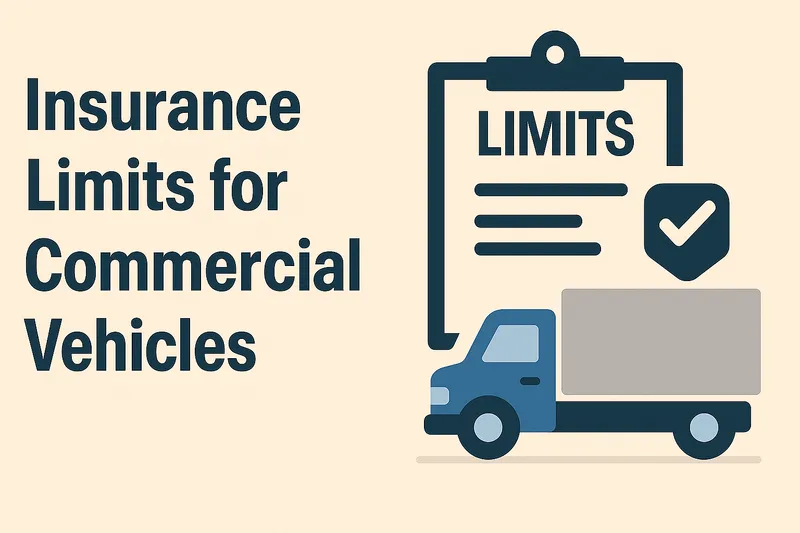Truck Accident Lawyers in Cumming, GA
Accidents with big rigs like 18-wheelers can be scary and overwhelming. These crashes often cause serious injuries and complicated legal situations. If you’ve been in a truck accident in Georgia, it’s important to know what steps to take and how Georgia law treats these cases.

Liability in Truck Accidents: Who Can Be Held Responsible?
Truck accidents are complex. Unlike a car-on-car collision, where usually only the drivers are involved, a truck accident can involve several parties. In Georgia, if you are injured in a truck accident, you may be able to pursue a claim against any party whose negligence helped cause the crash. Understanding who might be responsible is a key step in protecting your rights and getting the compensation you deserve.
Key Parties That Can Be Held Liable
- The Truck Driver
If the truck driver was careless or broke the rules of the road, they can be held liable just like any other driver. Common examples of truck driver negligence include:
- Speeding or running a red light
- Falling asleep or driving under the influence
- Texting or other distractions
Because the truck driver is in control of the vehicle, any mistake they make can make them a key responsible party.
- The Trucking Company (Employer)
In Georgia, trucking companies can be held responsible for the actions of their drivers under the doctrine of respondeat superior. This means that if the truck driver was working—such as making a delivery—when the crash happened, the trucking company can be liable for the driver’s negligence. Trucking companies typically have deeper pockets and larger insurance policies, which is important when pursuing compensation. 3. The Truck’s Owner
Sometimes, the truck’s owner is different from the trucking company or driver. For example, if the truck is leased or operated by an independent owner-operator, the owner could also be held liable, especially if they did not properly maintain the truck. If a known mechanical problem, like faulty brakes, was not fixed, the truck owner might share the blame.
- Cargo Loading or Shipping Company
If a third-party company is responsible for loading the truck’s cargo, they could be liable if improper loading caused the accident. Unbalanced or unsecured cargo can lead to a crash, so if the freight shipper or loading crew failed to secure the load properly or overloaded the trailer, they may be considered negligent.
- Maintenance Providers or Mechanics
Trucking companies often rely on outside mechanics or service companies to keep their fleets in good condition. If a mechanic did poor work—such as faulty brake repairs or installing the wrong tires—and that failure led to the accident, the maintenance provider might be partly responsible.
- Truck or Parts Manufacturer
Sometimes a truck accident is caused by a design or manufacturing defect. If a key truck part (such as the steering mechanism or tires) fails due to a flaw from the factory, the manufacturer can be held liable under product liability law. Although these cases are less common, they are important if something does not add up about why the accident happened.
- Other Drivers or Third Parties
In some accidents, another driver or third party may share responsibility. For instance, if another vehicle cuts off the truck and causes the driver to swerve, or if a road construction crew left unsafe conditions, that party might also be partly at fault.
Common Challenges with Insurance Companies After a Truck Accident
Dealing with insurance companies after a commercial truck accident in Georgia can be an uphill battle. Large insurers and trucking companies often deploy tactics to protect their interests, which can catch victims off guard. Here are some common issues injury victims face and should be prepared for:
-
Quick Low-Ball Settlement Offers: It’s not unusual for an insurance adjuster to reach out soon after the accident with a quick settlement offer. They may do this before you’ve completed medical treatment or fully assessed your losses. The amount might seem like a lot initially, but it often doesn’t account for long-term needs like future surgeries, therapy, or lost earning capacity. Insurers know that accident victims are vulnerable and may need money fast, so they hope you’ll take a low offer and sign a release. In fact, insurance companies often start by offering low settlement amounts, expecting victims may not know the full value of their claim. Taking such an offer too early can leave you without enough funds to cover ongoing expenses. Always be cautious and consult an attorney before accepting any early settlement.
-
Disputing Liability (Blame Games): Trucking insurers frequently try to deny or reduce their driver’s fault in the accident. Their goal is to avoid paying or to invoke Georgia’s comparative negligence rule to reduce what they owe. You might find the insurer arguing that you or another driver were partly to blame – maybe claiming you were speeding, or you “came out of nowhere,” etc. Insurance adjusters may hunt for any evidence to assign partial fault to victims, because if they can say you were, say, 20% at fault, they can potentially cut the payout by 20%. In serious accidents, they might even hire accident reconstruction experts to argue their case. Victims must be prepared with strong evidence (police reports, witness statements, etc.) to counter these blame-shifting tactics.
-
Multiple Insurance Policies – Finger Pointing: As mentioned earlier, a truck accident can involve various insurance policies (truck’s primary liability, the motor carrier’s insurer, maybe a trailer owner’s insurer, cargo insurance, etc.). These different companies sometimes point fingers at each other. For instance, if a spilled load caused the crash, the truck’s auto insurer might say the shipper’s cargo insurance should pay for the damages, not them. Or if the truck driver was an independent owner-operator hauling for a larger company, the two insurers (driver’s vs. company’s) might dispute whose policy applies. This can delay your claim and complicate settlement, as each insurer tries to dodge full responsibility. An attorney can navigate these issues by pursuing all angles and not letting the insurers shrug off their duty.
-
Delays and Denials: It’s an unfortunate reality that insurance companies sometimes delay investigations or deny valid claims outright. They might take their time collecting information, hoping that you’ll become desperate or the statute of limitations will draw closer, pressuring you to settle cheaply. A denial could come if the insurer believes they have evidence to argue their driver wasn’t at fault or if they see a procedural loophole. For example, they might deny a claim saying their truck driver wasn’t actually an employee (trying to avoid vicarious liability for the company), or argue that your injuries were pre-existing and not caused by the accident. If you receive a denial, it’s not the end – many denials can be challenged or appealed. Often, insurance companies deny claims when they think they have enough evidence to dispute fault or causation, but new evidence or legal pressure can change that.
-
Pressure Tactics and Recorded Statements: Insurance adjusters may act friendly and concerned on the phone, but be very careful. They often ask victims for a recorded statement soon after the crash. The problem is, they are trained to ask questions that could get you to inadvertently say something that hurts your case (such as downplaying your pain or admitting you were “in a hurry” or some speculative comment). You are not required to give a recorded statement to the other driver’s insurer. It’s usually wise not to do so without legal counsel. Similarly, adjusters may pressure you to sign medical release forms that are overly broad – allowing them to dig into your entire medical history to try to pin your injuries on something else. These are tactics to undermine your claim, and an experienced lawyer will shield you from unnecessary disclosures while providing the information actually needed.
-
“We Don’t Need a Lawyer Involved” Line: Sometimes insurers will tell victims something like, “Hiring a lawyer will just reduce your net because of fees” or “We can work this out without an attorney.” Remember, this advice serves the insurer’s interests – studies have shown that represented victims often recover significantly more, even after attorney fees, than unrepresented ones, especially in serious injury cases. Trucking companies and their insurers have lawyers; you should have one, too, to level the field. They know that if you get a competent truck accident attorney, they can’t easily get away with low offers or bad practices.
All these challenges underscore that insurance companies – even your own in some cases – are not truly on your side after a truck accident. Their goal is to minimize payout. As a victim, your focus should be on recovery and getting compensated fairly, which often means pushing back against these tactics. Keep detailed records of everything related to the accident and your injuries. Obtain the police report. Consult with a Georgia truck accident attorney who knows the tricks of the trade. An experienced lawyer can take over communications with the insurers, ensure evidence is preserved (like trucking company records or video footage), and fight for the maximum compensation you deserve, whether through settlement or trial.
Multiple Parties and Fault Distribution
Truck accidents often involve several parties. Georgia law allows accident victims to pursue claims against any party whose negligence contributed to the crash. If more than one party is at fault, they can each be held responsible for a portion of the damages.
Georgia follows a modified comparative negligence rule. This means:
- You can still recover damages if you are less than 50% at fault.
- Your compensation will be reduced by your percentage of fault. For example, if you are found 20% responsible, you can recover 80% of your damages.
- If you are 50% or more at fault, you cannot recover any compensation.
Insurance companies sometimes try to shift some blame onto you to lower your payout. That’s why it’s important to have strong evidence and proper legal guidance.
Why You Need a Truck Accident Attorney
Truck accident cases are often very complicated because of the many parties involved and the strict rules that govern them. A skilled truck accident attorney can help you by:
- Investigating your case to identify all responsible parties.
- Gathering important evidence like driver logs, maintenance records, and black box data.
- Handling communications with insurance companies to prevent lowball offers.
- Helping you understand Georgia’s laws and ensuring you receive fair compensation.
Steps to Take Immediately After a Truck Accident
Being in a truck accident is disorienting, but taking the right steps afterward can protect your health and legal rights. Here are the crucial actions you should take immediately after a truck crash:
-
Stay Safe and Avoid Further Danger: If possible, move your vehicle out of traffic to prevent another accident. Turn on hazard lights or use cones/flares if available. However, do not leave the scene – stay until police arrive. Checking on others is good, but if someone is seriously hurt, wait for professional help instead of moving them, which could worsen injuries.
-
Gather Evidence at the Scene: If you are able, use your phone to take photos or videos of the accident scene. Capture the damage to all vehicles, the position of the truck and your car, skid marks or debris on the road, and any road conditions (like traffic signs, signals, or hazards). Also photograph your injuries if they are visible. These pictures can serve as crucial evidence when dealing with insurance companies or if you pursue a legal claim. If any nearby businesses or traffic cameras might have caught the accident, make a note to preserve that footage if possible.
-
Seek Medical Attention Immediately: Do not delay getting medical care. Even if you feel “okay,” get checked by paramedics or visit a doctor as soon as possible. Some serious injuries (like internal injuries, concussions, or whiplash) might not show symptoms right away. A medical exam creates an official record of your injuries from the crash, which can serve as important evidence later. Follow the doctor’s orders and keep records of all treatments, as these will document the harm you suffered.
-
Notify Your Insurance Company: Report the accident to your own auto insurance company promptly. Provide the basic facts (when and where it happened, the parties involved) but do not give a detailed statement or accept blame. Importantly, avoid speaking at length with the trucking company’s insurance adjusters or lawyers without getting legal advice first. The truck company’s insurer might contact you very quickly after the crash. They may seem friendly, but remember that their goal is to minimize liability. It’s okay to politely refuse to give a recorded statement or to sign anything until you’ve sought advice. Simply inform them that the accident is under investigation.
-
Document What You Remember: As soon as things calm down, jot down everything you recall about the accident while it’s fresh in your mind. Note the timeline, weather, road conditions, and exact sequence of events. Personal notes can help you remember details later when you talk to lawyers or insurance.
-
Consult an Attorney (Especially for Truck Accidents): Truck accident cases can be much more complex than a regular car wreck, so it’s often wise to speak with an experienced Georgia truck accident attorney early on. A lawyer can guide you on your rights, help preserve critical evidence, and deal with insurance companies on your behalf. (We’ll discuss later why hiring a lawyer can be crucial in truck crashes.) For now, know that it’s okay to reach out for legal help – many attorneys offer free consultations for accident victims.
Following these steps will help protect your health and start building a strong foundation for any insurance claim or legal action. Your first priorities should always be safety and medical care, but also remember to gather information and evidence while on the scene if you can. Acting quickly and calmly after a truck accident can make a big difference in the outcome of your case.
Truck accidents often cause serious injuries – traumatic brain injuries, spinal injuries, multiple fractures, etc. You might be facing surgeries, rehab, lost income, and significant pain and suffering. It’s critical to hire an attorney to help you properly value these damages and recover fair compensation.
Truck Wreck Resources


35+ Years Experience
For over three decades, we've been dedicated to representing thousands of injury victims throughout Georgia.
Million-Dollar Results
Our proven track record includes numerous million-dollar settlements for clients with catastrophic injuries.
4.9/5 Stars on Google
Our clients love us. See why we're consistently rated among the top attorneys in Georgia.
Our Attorneys:
Fill out this form for our top-rated truck attorneys to get started on your case
Get a free consultation and answers to your questions. Just fill out the form below and we will reach out to you.




